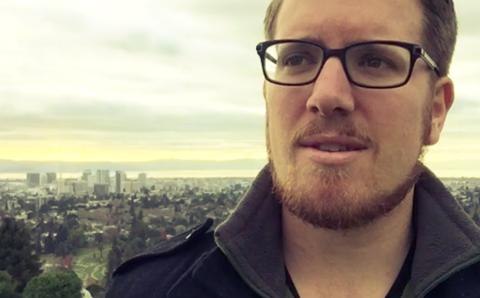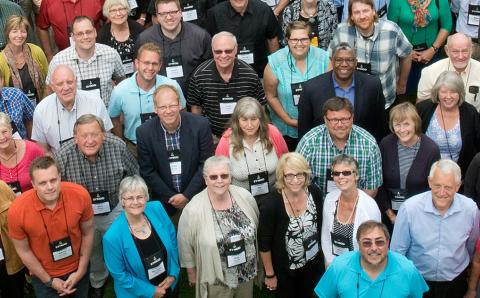The day after recommending pastoral guidance that advises officebearers in the Christian Reformed Church not to participate in same-sex weddings, Synod 2016 appointed a study committee to study human sexuality. Synod is the general assembly of the Christian Reformed Church.
The new committee, which has been given five years to do its work, is mandated to “articulate a foundation-laying biblical theology of human sexuality that pays particular attention to biblical conceptions of gender and sexuality.”
The members of the committee are to be required to “adhere to the CRC’s biblical view on marriage and same-sex relationships.” Asked about the meaning of “adhere” in that statement, Peter Hoytema, the reporter of the committee presenting the proposal, said it meant “stick to it with openness to other options.”
Joel Zuidema, Classis Illiana, pressed the point, “How will this [adherence] be found out? How will it go?” Hoytema said that when members of the committee are appointed they will simply be asked about it. With that the delegates let go of whether or not requiring members to adhere to the denominational position on the questions to be studied by the committee foreclosed the results before the committee has even begun its work.
Delegate Joe Kamphuis, Classis Red Mesa, said that the denomination is not ready to have this discussion. He said, “We don’t listen to each other’s stories. We don’t hear what’s going on in the various classes [regional groups of churches].” He said that five to 10 years from now the denomination may be more ready. Better, he said, to pay attention now to ongoing discussions. He referred to a report produced by Classis Grand Rapids East and one by the Returning Church group.
But Khary Bridgewater, Classis Grand Rapids East, said, “It doesn’t matter if we are ready; our members are. We must have this conversation, and we must have it now.”
Ed Gerber, Classis British Columbia South-east suggested that we need such a study because under a veneer of unity there are profound differences among members of the CRC. He used the metaphor of a tree with two quite different shoots coming up. He said, ”Let’s take a look at the roots. We keep talking about the symptoms and not the cause.”
Jennie Hengeveld-Misner, Classis Northern Illinois, wanted the study for quite a different reason. She raised the case of a member of her congregation who was in the process of gender transition. Members of the church council wanted to discipline the member, but she asked, “What’s the sin?” She noted that in this case the Bible was much talked about but not actually studied. She thought a study committee could provide councils in churches like her own advice on which to act.
The synod has far-reaching aims for the new study. The new study committee is “to provide concise yet clear ethical guidance for what constitutes a holy and healthy Christian sexual life.” The hope is that the eventual report will provide “guidance that explains how the gospel provides redemptive affirmation and hope for those experiencing sexual questioning, temptation, and sin.”
The new study committee was also asked to decide “whether or not, with respect to same-sex behavior and other issues identified in the study, it will be advisable for future synods to consider declaring a status confessionis. Such a declaration would make one’s view of sexuality a creedal matter. As such, all persons ordained in the church would be required to assent to the official church teaching.
Chelsey Harmon, Classis British Columbia North-west, was troubled by another possibility entertained by synod: that the new study committee might appoint a team to draft a new confession in the style of the contemporary testimony on human embodiment and sexuality. Synod changed that to a “statement of faith” but retained the reference to the contemporary testimony.
There were dissenting voices. Emily Ulmer, a women adviser, spoke of people who are “post-Christian,” who no longer care what is happening in synods. “Although I’m advised not to express my emotions, I’m angry.” She said that any report on sexuality should not be limited “to sexuality this body considers disordered,” but to the whole topic.
Ulmer’s passion for those who no longer consider the church relevant was followed by Cornelius Hutt, Classis Atlantic Northeast, who spoke of his fraught relationship with a same-sex oriented daughter whom, he said, “has been led astray by creative readings of Scripture.” He struggled in his relationship to both love his daughter and keep Scripture primary.
Synod said the committee will include at least three ethnic minority pastors and/or theologians, at least three faculty members from Calvin Theological Seminary, a same-sex attracted person, a gender dysphoric person, two pastors, a chaplain, a philosopher, and a scientist. The committee will also include a promotor fidei. More popularly known as the “devil’s advocate,” that person would be assigned to “raise difficulties and doubts regarding the biblical, scientific, and Reformed validity of all arguments presented during the study committee’s work. This person will suggest other explanations and alternative perspectives to those being presented by the study committee.”
Ashley Bootsma, a Young Adult Representative, lamented the lack of young adult representation of the committee. She said of the 13 member slots, only two could conceivably be offered to people under 25.
Mostly the delegates were happy to have the new committee and placed great confidence in its ability to resolves the knotty issues of human sexuality. Michael Winnowski, Classis Wisconsin, reminded the synod that biblical authority is foundational. He spoke of the need for “the denomination to tell the truth to ourselves, to our children, and to the world God loves.”
The committee is scheduled to submit an interim report to Synod 2019 and its final report to Synod 2021.
Synod 2016 is meeting at Calvin College in Grand Rapids, Mich., from June 10-17. For continuous Banner coverage, please follow The Banner Magazine on Facebook or @crcbanner on Twitter. You can find more tweeting by following hashtag #crcsynod. News stories will be posted at thebanner.org several times daily. Unless noted otherwise, all photographs are by Karen Huttenga.
About the Author
Clayton Libolt was the long time pastor of River Terrace Church in East Lansing, Mich. Since his retirement, he has served in a variety of interim positions. He is presently serving as the interim senior pastor of Sonlight Community CRC in Lynden, Wash.









